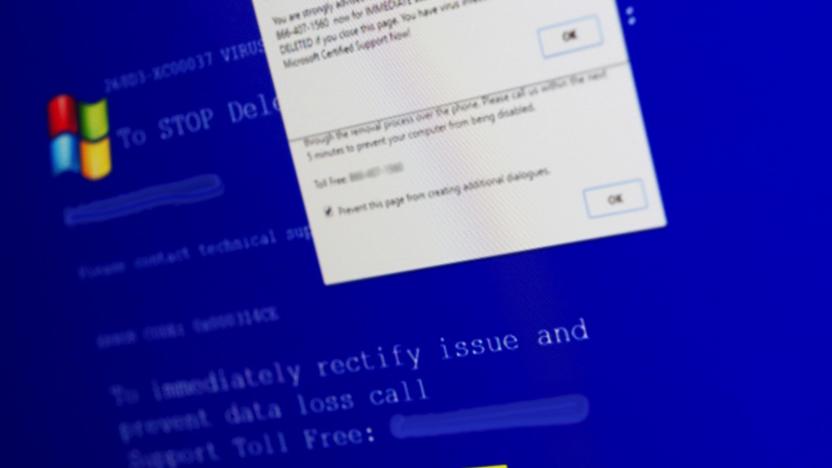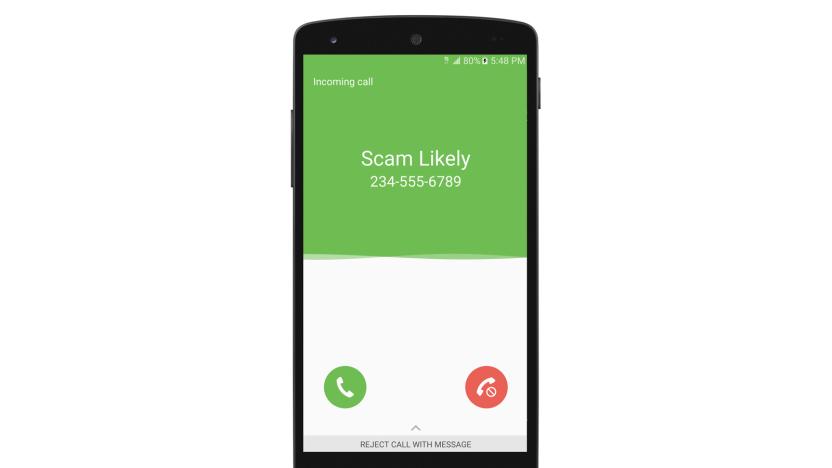scam
Latest

Valve removes 'Active Shooter' from Steam amid outcry
Valve has removed Active Shooter from its Steam platform. The game allowed players to play through school shooting scenarios either as a civilian, the shooter or the police. As The Guardian reports, the game apparently started as a SWAT team simulator, but a recent update added the ability to play as the shooter, with an on-screen counter tallying how many police and civilians you'd killed. "We have removed the developer Revived Games and publisher ACID from Steam," Valve said in a statement to The Guardian.

Fake Mark Zuckerbergs tried to scam Facebook users for cash
A number of Facebook and Instagram accounts have been parading as Facebook CEO Mark Zuckerberg and COO Sheryl Sandberg, tricking vulnerable individuals into sending large amounts of money in order to collect bogus lottery winnings, the New York Times reports. The newspaper describes multiple cases wherein Facebook users were contacted by fake accounts claiming to be Facebook executives offering hundreds of thousands of dollars in supposed winnings. In many cases, the "winners" were asked to send hundreds of dollars in iTunes gift card redemption codes or even thousands of dollars in cash -- delivery fees required for collecting the lottery funds.

Why is a celebrity personal-finance guru suing Facebook?
Martin Lewis is a British journalist, TV presenter and Ralph Nader-esque campaigner who has announced that he will sue Facebook for defamation. The consumer champion has seen his face co-opted by nefarious types who use his name (and brand) to sell cryptocurrency scams. These get-rich-quick ads are often posted on Facebook, and because the social network doesn't seem to have a handle on them, Lewis is taking the battle to court.

Fake Black Lives Matter page on Facebook eclipsed the real thing
Facebook has had some success purging fake and misleading pages, but it's evident there's still work to do. CNN has discovered that the most popular Black Lives Matter page for the past year was a scam -- it was supposedly fundraising for BLM causes in the US, but sent at least some money to Australian bank accounts and frequently linked to the websites from Ian Mackay, a workers' union official in Australia. It had nearly 700,000 followers where the real activist group's page has less than half that amount.

Scientology is launching a TV network with streaming options
Scientology's relentless marketing push is evolving for the modern era. Hollywood Reporter has confirmed that the organization is launching a TV network on March 12th, and it'll include the virtually obligatory streaming apps. In addition to broadcasting on AT&T's DirecTV, it'll also offer streaming through mobile apps (at least iOS), Apple TV and Roku devices. It's not certain what the network will offer online as of this writing, but there will be on-demand clips in addition to live fare.

Woz was scammed out of Bitcoins now worth over $70,000
Apple co-founder Steve Wozniak has demonstrated the issue of bitcoin fraud by falling victim to an old school internet scam. Speaking at The Economic Times of India's global business summit this week, he said that someone bought seven bitcoins from him using a credit card, but canceled the card after the bitcoin was transferred, so the payment failed to process. And of course the card was stolen, so there was no way to retrieve his lost assets. He bought when the cryptocurrency was priced at $700, but the loss would be worth the equivalent of $71,400 today.

US charges cryptocurrency creators over $6 million scam
US regulators are making good on their promise to get tough on crypto fraud. The Commodity Futures Trading Commission has filed complaints charging My Big Coin Pay and two of its operators, Randall Crater and Mark Gillespie, with using the company's My Big Coin cryptocurrency as part of an ongoing, not-so-subtle Ponzi scheme. Crater and Gillespie allegedly drew investments in the virtual money by making numerous bogus claims (that it was traded on multiple exchanges, backed by gold and had a MasterCard partnership) and promptly "misappropriated" the $6 million in funds for buying a home, jewelry, vacations and other indulgences.

Airbnb is reportedly being used to launder money
Criminals have long been exploiting online marketplaces for money laundering purposes, and the latest service to reportedly fall prey to fraudsters is Airbnb. According to a Daily Beast report, Russian scammers are leveraging the service to launder dirty cash from stolen credit cards with the help of corrupt hosts. The fraudsters are recruiting for their Airbnb abuses on Russian-language crime forums, with posts seeking everything from collaborators to hacked accounts.

Recommended Reading: Trust your gut
Is Your Gut Microbiome the Key to Health and Happiness? Amy Fleming, The Guardian You've likely heard the phrase "trust your gut" at some point in your life, but the key to being healthy and happy could actually lie in all of those organisms in your digestive system. The Guardian lays out the case for how influential your gut really is and discusses the act of "poop doping." Yes, that's a thing.

AI’s latest application: wasting email scammers’ time
Schadenfreude is one of life's simplest pleasures -- especially when the victim in question is an email scammer. That's the service Netsafe's Re:scam provides. Simply forward your Nigerian prince emails to the service and it'll use machine learning to generate conversations to waste the nefarious Nancy's time. The idea is that any time jerks spend engaging with the bots is time that can't be used to target hapless victims. People have passed some 6,000 emails Re:scam's way this week alone, and apparently there were 1,000 concurrent conversations at one point. So far the longest email chain has involved 20 exchanges, according to The Guardian.

IRS warns that tax-related phishing scams are on the rise
According to the IRS, the amount of phishing scams targeting W-2 forms rose sharply this year compared to last. In 2016, around 50 companies and organizations fell victim to such scams while during this year's tax season, that number increased to around 200. They were aimed at businesses, public schools, universities and nonprofits among others and several hundred thousand employees' data were stolen.

Pros weigh in on phishing the White House
Just before Anthony Scaramucci's 15 minutes -- er, I mean 10 days -- of White House fame were up, a man in the UK (who imaginatively calls himself "Email Prankster") had some choice words with him via email. Nothing weird there you think? Except that he did it while posing as former White House Chief of Staff Reince Priebus. Not that getting "the Mooch's" metaphorical goat was expected to be difficult. Especially after he went ballistic on New Yorker reporter Ryan Lizza for merely mentioning his enemies. No, the remarkable thing was that Scaramucci was one of many the prankster fooled among Trump's totally cyber-savvy and not-chaotic White House cabinet of curiosities.

MetroPCS customers can use T-Mobile's scam-fighting tools
Shortly after the FCC revealed its plan to fight robocalls, T-Mobile introduced two anti-scamming tools back in March to alert customers to shady calls. Now, the carrier is giving MetroPCS users the same treatment, making Scam ID and Scam Block available for free on July 25th.

China's 'elevated' bus was a scam after all
Remember that Chinese public transit experiment running an elevated bus over 300 meters of track along a major roadway? Unfortunately, the test site started gathering dust as "financial problems" and other suspicious setbacks reportedly set in months after the oddball vehicle's unveiling. But now it's official: Chinese authorities believe the whole thing was a scam and have started investigating (and arresting) accordingly.

Airbnb is buying a scam-fighting background check technology
Airbnb is getting more serious when it comes to keeping fraudulent listings and shady renters off the website. According to Bloomberg, the short-term rental platform is buying Trooly Inc., a startup specializing in background checks to fight off scammers. Airbnb has been using Trooly's service to authenticate user identities since 2015, but now the company is making its tech an integral part of the platform by purchasing its intellectual property and its engineering team.

FTC cracks down on internet tech support scams
The Federal Trade Commission isn't letting up in its quest to rid the world of tech support scammers. Officials have launched a legal campaign, Operation Tech Trap, in a bid to crack down on frauds that rely on a mix of web pop-ups and phone calls to frighten you into paying up. The effort includes four fresh complaints (in Alabama, Colorado, Florida and Ohio), two settlements (in Connecticut and Florida) and charges against seven people -- two of which have already pleaded guilty. It's as much a public show of the FTC's might as it is a significant bust, but many of the perpetrators were particularly insidious.

Facebook limits News Feed links to scammy ad-filled sites
Facebook regularly tweaks your news feed to make sure you only see "quality" posts and ads. It's banned fake news sites from using the Facebook ad network, added an easy way to report false news posts, and has even hired third-party fact-checkers. Today, however, the company announced that it would focus its efforts on websites that contain "little substantive content and that is covered in disruptive, shocking or malicious ads." The news feed update is meant to help reduce the "incentives of financially-motivated spammers."

Beware phishing emails posing as Google Docs invites (updated)
If you received an out-of-the-blue email purporting to share a Google Docs file, you're not alone -- and whatever you do, don't click the link inside. Many people online, including more than a few journalists, have been bombarded with phishing emails (currently from a mailinator.com account) that try to trick you into opening a fake Google Docs link. If you click through and grant a bogus "Google Docs" app access to your Google account, the perpetrators can get into your email. And of course, havoc follows after that -- the app spams email to everyone you've ever messaged, and bypasses Google's usual login alerts (including for two-factor authentication).

T-Mobile fights phone scams with new tools for customers
This week, the FCC revealed its plan to battle robocalls. Part of that initiative includes allowing phone companies to target and block calls from fake or suspect phone numbers. Those rules are still being finalized, but T-Mobile isn't wasting any time on the matter. Today, the Uncarrier began rolling out two tools to its customers to help with phone scams: Scam ID and Scam Block.

Email scheme stole $100 million from two US tech companies
It's tempting to assume that technology workers are intelligent enough to avoid email fraud, but that's not always the case. Both the FBI and the state of New York have charged a Lithuanian man, Evaldas Rimasauskas, with perpetrating a phishing campaign that siphoned $100 million away from two US tech companies. They're both choosing to remain unnamed, although one is a "multinational online social media company" -- you can probably whip up a short list of candidates based on that description. The scheme wasn't particularly complicated, either, and mostly relied on less-than-attentive employees.










